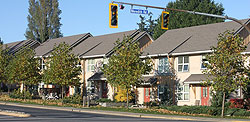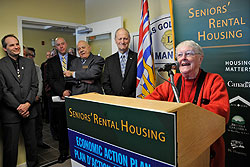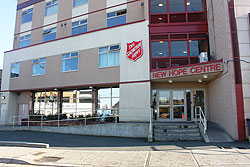Meeting Regional Housing Needs
 Ideally, affordable, appropriate, and adequate housing should be available for people of all abilities, incomes, lifestyles and household sizes. In addition, housing should be close to everyday needs such as jobs, shops, schools and recreation - this helps to lower household costs by reducing the need to rely on private cars to get around.
Ideally, affordable, appropriate, and adequate housing should be available for people of all abilities, incomes, lifestyles and household sizes. In addition, housing should be close to everyday needs such as jobs, shops, schools and recreation - this helps to lower household costs by reducing the need to rely on private cars to get around.
A Collaborative Approach
 Meeting regional housing needs requires an integrated and collaborative approach with member municipalities, other levels of government (Federal, Provincial & First Nations) and numerous non-profits who have an already established track record addressing housing issues in the RDN.
Meeting regional housing needs requires an integrated and collaborative approach with member municipalities, other levels of government (Federal, Provincial & First Nations) and numerous non-profits who have an already established track record addressing housing issues in the RDN.
The purpose of this website is to
- Raise Awareness about housing needs and actions that the RDN and other organizations are taking to increase housing choice and affordability in the region.
- Provide Information on housing resources for community members, housing advocates and providers, developers, employers and RDN member municipalities.

Affordable Housing & the RGS
The updated 2011 RGS includes a specific goal and policies that provide the RDN and member municipalities with direction to support and facilitate the provision of affordable housing:RGS Goal 6. Facilitate the Provision of Affordable Housing - Support and facilitate the provision of appropriate, adequate, attainable, affordable and adaptable housing.
Click here to read a summary of how the RGS supports Affordable Housing.
Housing Action Plan
On January 25th 2011, the RDN Board directed staff to proceed with several actions in a Housing Action Plan that identifies how the RDN can support and facilitate the provision of appropriate, adequate, attainable and affordable housing throughout the region. The Plan focuses on effective actions that can be accomplished using existing budgets and staffing resources.The RDN's Housing Action Plan promotes a collaborative approach to meeting regional housing needs with a strong focus on complimenting and supporting the ongoing initiatives of RDN member municipalities, Provincial and Federal Governments together with various non-profit agencies. Further information on the Action Plan can be found below:
- December 2010 Housing Action Plan
- January 2011 Staff Report to the RDN Board
- Regional Growth Strategy Discussion Paper on Housing Affordability
Housing Affordability Study
The Housing Action Plan responds to the results and recommendations of the RDN's 2009 Housing Affordability Study. The Housing Affordability Study was conducted in two phases:
- Phase 1: Housing Needs Overview
The first phase confirmed that the supply of affordable housing throughout the region falls short of meeting the needs of those least able to afford adequate housing.
- Phase 2: Connecting Housing Needs and Opportunities
The second phase addressed solutions to the housing needs identified in the first report. The findings and recommendations of this report were used to guide the RDN's 2010 Housing Action Plan.Housing Incentives
The Housing Incentives document lists incentives provided by the RDN (as well as member municipalities and other levels of government) to encourage the creation of different types of affordable housing by non-profit organizations and market based developers.
 The RDN does not directly provide services to meet the needs of those facing homelessness in the region, however we do provide support to those already doing a good job of providing these important services. This includes redistributing funding received from other levels of government to organizations with a mandate to end homelessness.
The RDN does not directly provide services to meet the needs of those facing homelessness in the region, however we do provide support to those already doing a good job of providing these important services. This includes redistributing funding received from other levels of government to organizations with a mandate to end homelessness.
On June 26, 2012 the RDN Board allocated 60% of grant funding received from Vancouver Island Health Authority (VIHA) for Capacity Building to end Homelessness to the City of Nanaimo and SOS on behalf of the Oceanside Homelessness Task Force. The funding was distributed on the basis of population in School Districts 68 and 69. The remaining 40% was set aside in a reserve fund for distribution at a later date.
As of November 2014, the RDN Board had allocated all of the money in the reserve fund to various programs and projects to address homelessness. The staff report below provides more information for how the money in the reserve fund was distributed.Affordable Housing Incentives
This document lists incentives provided by the RDN and Member Municipalities (as well as other levels of government) to encourage the creation of different types of affordable housing by non-profit organizations and market based developers.City of Nanaimo Homelessness and Supportive Housing
The City of Nanaimo is involved in several initiatives to help end homelessness. This includes working with other levels of government and non-profit organizations to facilitate the provision of supportive housing and other services to meet the needs of those facing homelessness.Contact: John Horn, Social Planner, City of Nanaimo - 250 755-4483Nanaimo Working Group on Homelessness
The NWGH is a committee of government, non-government agency and community representatives who work to address homelessness in Nanaimo and surrounding areas. The group functions to advise and support the work of non-profits to provide housing and services to meet the needs of those facing homelessness, including administering funding.Contact: John Horn, Social Planner, City of Nanaimo - 250 755-4483Oceanside Task Force on Homelessness
Formed by the City of Parksville in 2010, the mandate of the Task Force is to address homelessness and issues related to homelessness in School District #69, including the City of Parksville, Town of Qualicum Beach and surrounding communities in the regional district. The Task Force provides funding and input to the work of non-profits working to address homelessness. Through The Salvation Army, the Task Force operates an extreme weather shelter from November 1 to March 31.Task Force Co-Chairs:
Renate Sutherland, Executive Director, Society of Organized Services - 250-248-2093For a list of other organizations working to end Homelessness and meet regional housing needs Click Here.
Violet Hayes Island Crisis Care Society, 778-441-4227
Sharon Welch (Forward House Community Society 250-954-0785
- Educate yourself about affordable housing challenges and opportunities
- Share your knowledge with friends, family, neighbours, co-workers and peers
- Help those you know with housing needs identify and access resources
- Support affordable housing developments in your neighbourhood
| Watch These Videos to Learn More | |
|---|---|
Homelessness  Watch this video to understand the challenges and opportunities facing those who are homeless and what some communities are doing to address these challenges. Although this video discusses the experience of the City of Vancouver it is relevant to the issues in the RDN. |
Affordable Housing  Watch this video to understand the impact that affordable homeownership has on the lives of those with smaller incomes. This video shows how organizations like Habitat for Humanity make home ownership more accessible for those with smaller incomes. |
